“That’s what we need,” Lucas said. “When can we get in?”
Weaver looked at his watch: “Maybe five minutes?”
Weaver hooked them up to the FBI database and after a few minutes’ instruction, left them alone to work the records. Weeks had given them a half dozen possible targets in addition to Morris, and they checked them all, looking at mug shots, histories of violence, and taking down relevant location information. Finally, they pulled up Magnus Elliot’s file. Lucas had assumed he’d be black or Hispanic, because of the way Morris had talked about him. Elliot looked like he’d just gotten off the boat from Sweden.
“Won’t be hard to pick out,” Lucas said. “Looks like the lead singer in one of those hair bands back in olden times.”
“Twisted Sister,” Bob said. “My brother still has their albums.”
That done, they looked up the Blue Tuna Gang. The FBI had nothing under that name, but the Miami Herald did. One of the defendants was named John Gentry. They found a John Gentry in Miami with a Florida driver’s license and a boat registration. The address, when they looked it up, was in the Coconut Grove neighborhood of Miami, so Axel Morris had gotten it right.
The Herald also referred several times to a DEA agent named Mac Campbell, who’d led the investigation into Gentry. The FBI files kicked out a recent cell phone number for Campbell, with a note that he’d recently retired from government service.
“We can call him on the way down to the Coconut place,” Bob said. “Maybe get lucky.”
“You ready to do it?” Lucas asked.
“Sure. On the edge of impatient,” Bob said. “We’re running hot.”
They put all the names, addresses, and mug shots on Bob’s iPad. They’d go after Gentry first, because he apparently knew something specific: that the diver was female. Magnus Elliot they’d pick up later.
CHAPTER
SEVEN
The day before had been hot, but a cool front had come through, driving the temperatures into the low sixties, and the natives were wearing coats. On the way down I-95 to Miami, Bob synced his phone with the truck so Lucas could participate in the call, and punched in the number for Campbell, the DEA agent who’d led the investigation into the Blue Tunas.
Campbell, as it turned out, was behind the wheel of his RV, headed south from Pennsylvania to Florida’s west coast, where he planned to spend the winter. They introduced themselves, and asked him what he remembered about Gentry.
“You can probably get the files, but the whole thing was an evidentiary mess,” Campbell said, the growl of the RV’s engine a steady background to his voice. “We knew they were bringing it in, but we couldn’t catch them red-handed. We finally got tired of chasing them around and got them indicted on the basis of testimony from people who worked for them. Boat unloaders, a wholesaler, like that,” Campbell said.
“Didn’t fly?” Bob asked.
“Never had a chance. We’d put witnesses up there and the defense attorneys would drag them through every single crime they’d committed since fifth grade,” Campbell said. “They’d ask the jury, how can you trust any of them? They were all asked why they were testifying against their supposed bosses and they all admitted they were getting deals. What the defense called bribes. Besides, the Blue Tunas never brought in the heavy stuff—only marijuana. Half the goddamn jury arrived stoned in the morning—there was no way they were going to convict on the basis of marijuana. Not in the nineties.”
“So they walked.”
“Yeah. I kept telling the U.S. attorney that they really needed to investigate these guys based on their lifestyles—they all had nice houses and cars. Not real flashy, but good. I asked, where’s the money coming from? I said, let’s look at their income taxes. That’s what I said. I bored everyone. That was just too big a pain in the ass for pot dealers. If they’d been living in beach mansions and driving Mercedes-Benzes, then maybe. But they weren’t. They were living in Coral Springs and driving Pontiacs.”
“I don’t know where Coral Springs is,” Bob said.
“Way out by the Everglades,” Campbell said. “Nice, but not the beach.”
“Maybe they weren’t making that much, then,” Lucas suggested.
“Oh, they were making it,” Campbell said. “They were smart. I was told that they agreed before they started smuggling that they’d do it for five years, and then get out. They put the money in some companies in the British Virgin Islands and you know what the BVI will tell you about that? Not a single fuckin’ thing. Their defense attorneys claimed that they took the Blue Tuna cases pro bono. Out of the goodness of their evil little legal hearts. Bullshit. They were paid in cash, under the table.”
“Pretty smart for dopers,” Lucas said.
“About as smart as they came, at the time. Like I said, not flashy, kept their heads down, spent a lot of time down in the Islands, moving around, so we really didn’t have access to them. They’d been operating for four years when we jumped them—and in that four years, I bet they hadn’t brought in more than eight to twelve loads . . . only one every four to six months. Very good stuff, though. High-quality Colombian. And when they moved, they brought in a lot. Five tons at a time. More.”
“That’s nuts,” Bob said. “Five tons at a time?”
“Carried it around in moving vans,” Campbell said. “That’s what we heard, anyway. Every time they brought in a load, they’d clear between five and seven million, after expenses. That was serious money back in the nineties.”
“Maybe fifty to seventy million free and clear,” Lucas said. “And they stashed it offshore.”
“Exactly. Living on it to this day. There were five principals in the group, so maybe . . . ten million each, after expenses? Twelve million? One of the guys was an attorney and another one was an accountant. Gentry had run a construction company before he got into the dope business. I looked him up once, a few years after the case, and he was building homes again. I think just enough to give himself a cover for the money he was spending.”
The drive to Coconut Grove ate up most of an hour. Gentry lived in a tall, two-story yellow-painted stucco house with a red-tile roof on Gifford Lane. The house had an attached garage with a five-foot-tall steel-bar gate across the driveway, and another steel-bar gate across the sidewalk leading to the front door. The small yard was crowded with palm trees, including one with coconuts.
They parked on the street and walked back to the house. Bob looked up at it and said, “If I owned this place, I’d tell the Marshals Service to kiss my ass and send the pension checks to Coconut Grove.”
The sidewalk gate was unlatched. They went through, up to the front porch, and pushed the doorbell. A dog barked—a small dog from the sound of it—and a moment later, Gentry pulled the door open and frowned at them. “Cops? What’d I do?”
Lucas said, “Nothing, as far as we know. Mac Campbell said to say ‘Hi.’”
Gentry laughed and said, “I wouldn’t mind talking to him someday, maybe buy him a beer, when enough time’s passed. Maybe it already has. Anyway, what do you want?”
Gentry was a solidly built balding man in his middle sixties, wearing white shorts and a pale blue golf shirt. He had a white brush mustache, a short pink scar below his left eye, and a cleft chin. He had smile lines on his face, and to Lucas looked like he might laugh a lot.
“We need to talk for a couple of minutes,” Lucas said. “We’re not here to arrest you, we’ve got no warrants or anything. We can talk out here if you like, but it’d be friendlier inside.”
Читать дальше
![Джон Сэндфорд Ocean Prey [calibre] обложка книги](/books/384313/dzhon-sendford-ocean-prey-calibre-cover.webp)
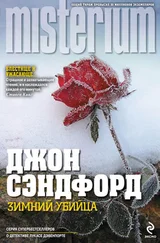


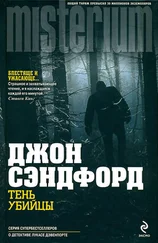
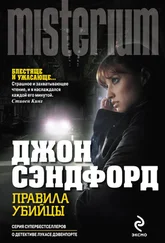
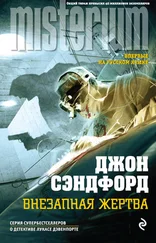
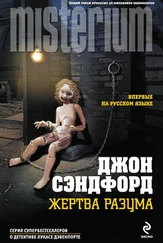



![Джон Ирвинг - Viename asmenyje [calibre]](/books/384315/dzhon-irving-viename-asmenyje-calibre-thumb.webp)
![Джон Ирвинг - Vandens metodas [calibre]](/books/384316/dzhon-irving-vandens-metodas-calibre-thumb.webp)